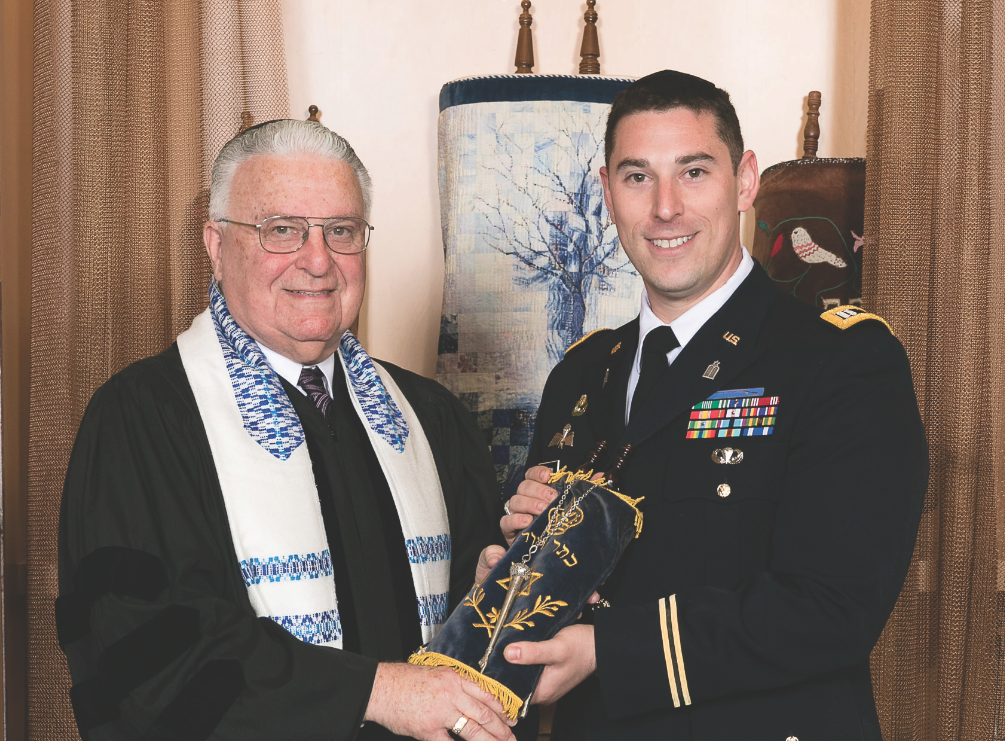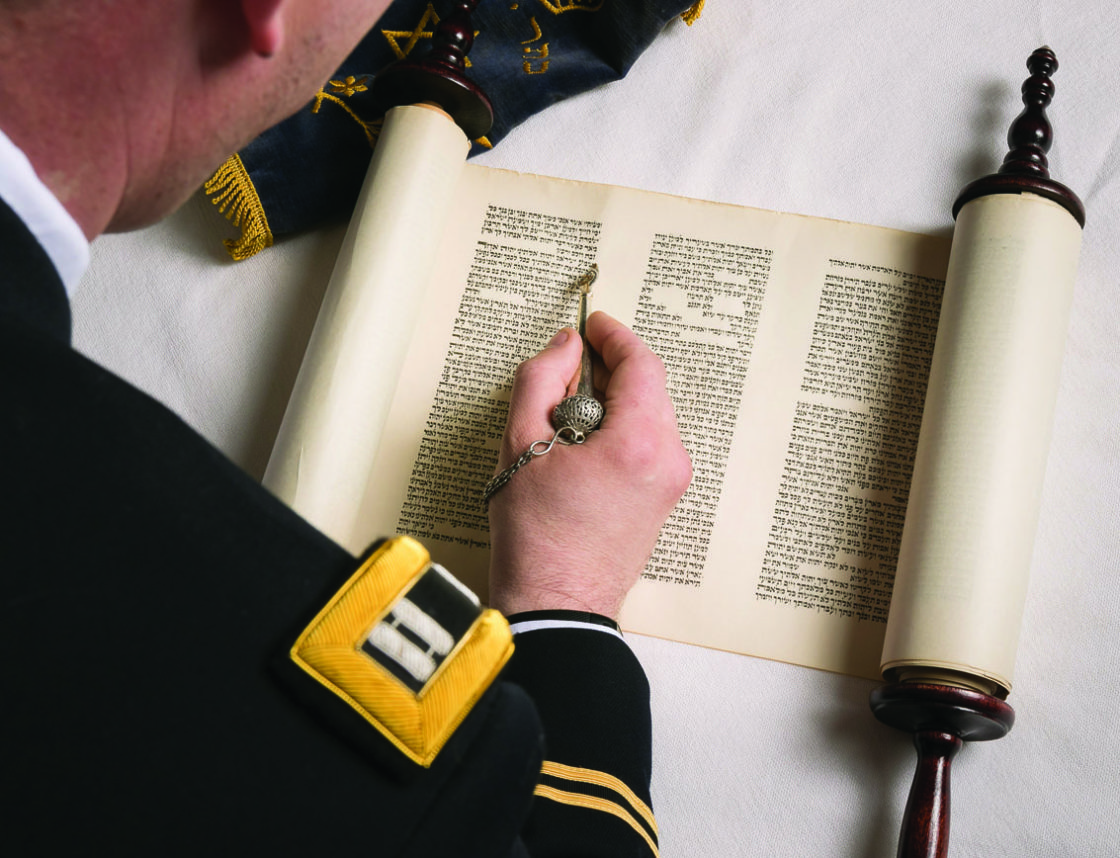 Rabbi Larry Goldmark (left) passes on his Torah to Michael Cohen, who was ordained as a rabbi on May 14. Photo by Marvin Steindler
Rabbi Larry Goldmark (left) passes on his Torah to Michael Cohen, who was ordained as a rabbi on May 14. Photo by Marvin Steindler Michael Cohen is the first to admit his was not the typical path for a Jewish kid from Nashville.
After college, he enlisted in the Army with a plan to become an Army chaplain. He served five years before transitioning from active duty to the reserves to pursue his rabbinical studies at Hebrew Union College-Jewish Institute of Religion (HUC-JIR) in Los Angeles, and on May 14 he was ordained with 12 classmates at a ceremony at Temple Emanuel of Beverly Hills.
“In the Nashville Jewish community, much as in the national Jewish community, no one serves in the U.S. military,” said Cohen, 32, whose wife, Emily Hyatt Cohen, also was ordained on May 14. He added, recalling his childhood, “My parents are both from New York and were very anti anything that looked like military.”
Cohen attended Sunday school at a Reform synagogue but his parents were not particularly religious. In a community where Judaism was not universally embraced, he learned to keep his religion quiet. His father, who died when Cohen was 16, did become more observant toward the end of his life. “That inspired me,” Cohen said.
His parents’ military sentiments aside, Cohen was inspired by his Boy Scout troop leaders, many of whom served in the Vietnam War.
“I learned from an early age that national service is one of the highest forms of [giving] back to a nation that has provided freedom for us,” he said.
Cohen’s experiences in the military continue to inform his work as a chaplain — in 2015 he became the Army’s first Jewish chaplain to serve after receiving a master’s degree; all others had been ordained.
In the Army, Cohen served in psychological operations — or, in layman’s terms, marketing. The goal was to get the local population to embrace the Army’s objectives through various media. Following the devastating 2010 earthquake in Haiti, he was with the 82nd Airborne Division, on a four-month humanitarian mission in support of the United Nations. Later, he spent a year in Afghanistan.
His most memorable interaction with an Army chaplain during his early service was far from positive. “I had a chaplain try to convince me that Judaism was proven false, was an antiquated religion,” Cohen said.
Other experiences with chaplains, while limited, weren’t much better, with one major exception. During his last year of active duty, Cohen had the opportunity to shadow a chaplain, an Eastern Orthodox priest and former officer, who was consistently friendly, accessible and comforting, Cohen said. “He was the chaplain I saw myself wanting to be.”
Cohen met Rabbi Larry Goldmark during his second year of studies at HUC-JIR. Goldmark was the leader of Temple Beth Ohr in La Mirada from 1979 to 2008 and for the past eight years has been a volunteer at the college, working closely with rabbinical students.
As a member of the reserves, Cohen sometimes wore his uniform to school, prompting Goldmark to offer that he, too, had been an Army chaplain. “We shared stories,” Cohen said.
From that day, Goldmark became one of Cohen’s closest confidantes.
“At different points in time, I felt a little browbeaten for my choice in career, stance on the military and support of the military,” Cohen said of his years of study. He recalled several occasions when a faculty member asked to reschedule a meeting because Cohen wore his uniform, rather than civilian clothes. Another time, a professor told him that people who join the military are naturally more inclined to be violent. Cohen made clear his disagreement.
“I felt a little bit like a pariah,” he said. “I would go to [Goldmark]. I would talk to him. He would comfort me and console me. He would be the person who understood what I was doing. He helped me maintain my faith.”
Cohen attributes the negative responses he faced to liberal and progressive attitudes toward the military that harken back to the Vietnam era and the mandatory registration for the Selective Service draft. “I compare it to nowadays when we have a professional, 100 percent volunteer army,” Cohen said. “It certainly isn’t what it was.”
He also faced other kinds of prejudice in the Army. He recalled a drill sergeant who called him “bagel” for four months. “A lot of things like that happened,” he said. “I had to push my Judaism aside and emphasize the soldier part. Now, I literally wear my religion on my chest.” Above his name on his uniform is an image of the two tablets of the Ten Commandments and a Jewish star.
Cohen’s experiences in the military continue to inform his work as a chaplain — in 2015 he became the Army’s first Jewish chaplain to serve after receiving a master’s degree; all others had been ordained.
One lesson he learned early on is the importance for a soldier to remain true to his religion.
“When service members come to me and say, ‘Can we do a Shabbat service?’ or do a certain thing here, in one part of my brain I have to think, maybe this is the only point during the week or month that this soldier can act Jewish,” he said.
Cohen, who has a young child, will return to active service in June, based at Fort Stewart in Georgia, and will spend much of 2018 in South Korea with the Third Infantry Division.

This time, he will have a beautiful hand-calligraphed Torah to use for Saturday morning Shabbat services and other occasions. The Torah was a graduation gift from Goldmark, who received it nearly 50 years ago when he began his military service. It was part of a kit given to him by the Jewish Welfare Board, now the Jewish Chaplains Council, that also included a Kiddush Cup and candles.
“[Michael’s] dedication, to both the military and being a rabbi, I find so overwhelming,” Goldmark said. “It led me to this idea of giving this Torah to him. … I wanted it to be perpetuated with the next generation of Jewish chaplains rather than sit in my library. I want it to be used, to have an immediate impact on the people that Michael is serving.”
Cohen initially declined, believing it was more than he could accept. He suggested he would take it on the condition that it was a loan.
“His response was, ‘No, it needs to be with soldiers. I want you to have it,’ ” Cohen said. “Ultimately, I was very appreciative and grateful, and I expressed that to him. … To me, a tallit or kippah or a siddur, all these things are sacred and have these mystical qualities. So when someone says, I am going to give you a Torah, that just kind of blew my mind.”
Cohen added, “I have this really wonderful idea that when I am done with my 20 years and retiring, that I can pass it along to someone else. … It’s not like there’s an updated version with a new chapter. … It will transcend Larry and myself and have its own legacy [of] providing service to soldiers.”






















 More news and opinions than at a Shabbat dinner, right in your inbox.
More news and opinions than at a Shabbat dinner, right in your inbox.